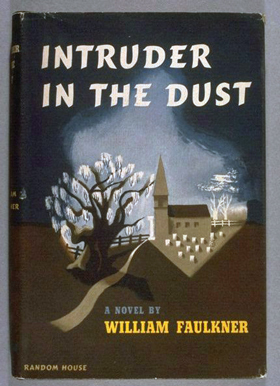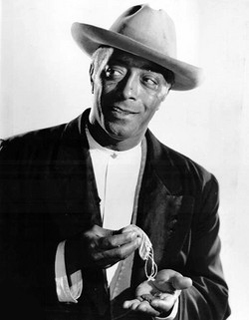
 |
|
|
|
The "social problem" movies of the 1930s voiced strong liberal opinions on subjects like lynching (They Won't Forget), prison corruption (I Am a Fugitive from a Chain Gang) and bigoted secret societies (Black Legion). The immediate postwar years saw a new wave of crusading pictures that stepped boldly forward on previously untouched subjects -- racial and ethnic prejudice. At about the same time that the armed forces were desegregated, liberal producers like Dore Schary and Darryl Zanuck were finding success fashioning outspoken, but compromised films. The Box office still ran on white star-power. Fox's Pinky cast white actors as blacks, as did the boldly honest independent Lost Boundaries. Schary's Crossfire was about the hate killing of a Jew; in the source story the victim had been a homosexual. Hollywood could admit that Jews existed, but not gays. By far the most artistically successful immediate postwar look at racial tension is MGM's 1949 Intruder in the Dust. Clarence Brown produced and directed this fine film, adapted from a book by William Faulkner. The show was filmed in Faulkner's hometown of Oxford Mississippi, standing in for the book's Jefferson. Instead of simply showing the injustice of racism, Faulkner penetrated into the psychology of a particularized black man, whose main affront is that he refuses to play the "submissive negro" for his white neighbors. The story closely follows that of Faulkner's 1948 novel. Teenaged Chick Mallison (Claude Jarman Jr., of Clarence Brown's The Yearling) holds a grudge against Lucas Beauchamp (Juano Hernandez) a propertied black man getting on in years. When Chick fell into an icy stream, Lucas offered him hospitality and a chance to dry his clothes, and refused Chick's attempt to pay him. Angered that he should be so humiliated by a stubborn black man, Chick has been trying to pay Lucas back, only to have his gestures repeatedly rebuffed. Then Sheriff Hampton (Will Geer) arrests Lucas for the murder of Vinson Gowrie, of the bigoted, mean-spirited Gowries. Lucas sends Chick for his uncle John Stevens (David Brian), a lawyer. But John presumes his client's guilt, and is angered when Lucas refuses to fully cooperate with him. Lucas tells Chick to investigate further. Along with the family servant Aleck (Elzie Emanuel) and Miss Eunice Habersham, a neighbor lady (Elizabeth Patterson), Chick travels in the dead of night to Gowrie territory to exhume Vinson's body, to see what kind of bullet did him in. Chick succeeds in getting John, the Sheriff and even old Nub Gowrie, the father of the victim (Porter Hall) in on the investigation. Meanwhile, Miss Eunice stands guard at the entrance to the jail, where a huge crowd watches the angry Crawford Gowrie (Charles Kemper of On Dangerous Ground). Crawford fills a jerry can with gasoline, in anticipation of burning Lucas to death. A woman with a baby walks up to Crawford and asks 'when he's going to do something'. 
Intruder in the Dust is in many ways a standard liberal film about racial prejudice. A black man's life is at stake, but we spend most of our time following a trio of white crusaders as their innate sense of justice emerges. Chick rebels against the Jim Crow attitude he finds at home. His father expresses disgust at the presumed lynching that will occur yet passively accepts the fact that Lucas will be burned alive -- the proper thing for good folk to do is look the other way until it's all over with. Miss Eunice is an exemplar of noble Southern values standing up for what's right, which in this case almost seems an accident -- we could just as easily see her independent thinker standing firm against racial integration. Chick and his Uncle John learn to respect Lucas Beauchamp's chosen form of dignity, which is easy to mistake with arrogance. Remarkably, the imprisoned Lucas Beauchamp remains the film's center of interest. The movie begins with the town emptied of blacks in anticipation of the white backlash to the news of the murder. But we see Chick's impressions of Lucas through a pair of telling flashbacks. The man acts fairly but coldly to Chick. When Lucas visits a general store, he refuses to defer to the Jim Crow rules and ignores Vinson Gowrie's taunts. He doesn't say "Sir" and enters by the front door. When the whites expect him to react with fear, he takes his time. A major William Faulkner tenet is that his characters are always formed by their environment. In the book (and an earlier story) Lucas's pride is made a deeper issue, as he is related by blood to an old white family of the district, and inherited his ten acres through this family connection. In the movie, a voice-over rushes through this fact. Uncle John initially resents his client's stubborn pride. Lucas won't play by white rules even when offered in sympathy. When he might be pulled from his cell and burned alive at any moment, why should he give anybody else the satisfaction of seeing him ask for favors, or beg to have his point of view considered? Lucas is a fierce and stubborn individual. He doesn't give a damn about 'representing his race' one way or another. The chilling "lynching day" festivities predate the evil carnival in Billy Wilder's Ace in the Hole. People arrive in buses waiting for the fun to start; loudspeakers play an old record of the song "Running Wild" over the Jefferson Town Square. We wonder if the residents of Oxford Mississippi who played extras for this scene realized that they were portraying social barbarians. Or did they love their local-boy-who-made-good Faulkner, and were proud to help make the movie? 1 
Black author Ralph Ellison hailed Juano Hernandez' portrait of Lucas Beauchamp in an essay called The Shadow and the Act. After looking at four recent race-themed movies, 2 Ellison declared Intruder in the Dust the only one that a Harlem audience could take seriously, the only one with a screen image with which black audiences could fully identify. In movies of this kind we keep waiting for Production Code or special interest compromises to show up, with scenes rewritten or re-shot to remove controversial statements -- or the author's main point. Black Legion is about the Ku Klux Klan, yet has no references to that organization's terror war on black Americans. The emotionally gripping The Well drops its fiery theme of racial conflict so completely that it doesn't bother to include its important black characters in its conclusion. Intruder in the Dust touches on some expected liberal preaching, but remains true to its Lucas Beauchamp character. Chick has saved the day, but he realizes that his motives weren't altogether noble, that his effort to repay his debt to Lucas was to get the man to acknowledge their relative status as black and white. At the end Chick sees that the whole town is now in the position he was in -- they're afraid to look Lucas in the eye because he has the upper hand and won't let go. They tried to kill him unjustly, and there's nothing the town can do to erase that guilt. John is humbled as well. He initially had not considered the possibility that Lucas might be innocent, and for that Lucas refuses to "go more than halfway" and feign gratitude. John then speaks the now- cliché line, "Lucas wasn't in trouble - we were." It's a mantra for guilty liberal filmmaking. Pauline Kael thought that this was Clarence Brown's best movie, and it's a beautiful production with its authentic locations and impressive characterizations. Brown's cameraman Robert Surtees shoots several scenes as indoor-outdoor setups, in particular dialogue scenes in John's office showing the crowds in the street below. The acting is excellent throughout. Of the white actors David Brian seems the least like a local, but his tough guy screen image is a plus that keeps him from coming off as a liberal sage here to dispense social wisdom. Claude Jarman Jr. has little star appeal, which is an asset for a character not meant to be a natural do-gooder. As Faulkner would prefer, Chick is a product of his environment. Often singled out for praise is Porter Hall as the one-armed Gowrie patriarch -- he's wholly convincing, as is Charles Kemper as his malevolent son. Kemper was on a roll with consistently arresting performances for directors like John Ford and Nicholas Ray before his untimely death in an auto accident just a couple of years later. Although she may seem a sentimental touch, Elizabeth Patterson's Miss Eunice was part of Faulkner's original book as well. From one angle the book does seem like a liberal concoction: in the racist south, justice is won by a callow kid, an old lady and a cynical lawyer. The movie doesn't play that simply -- the portrait of Lucas Beauchamp is far too powerful. 
The Warner Archive Collection DVD-R of Intruder in the Dust is another handsomely transferred Remastered Edition that presents this nearly forgotten masterpiece in tip-top condition. Robert Surtees' rural images seem unrelated to standard studio work (although not as rough as early examples of Italian neo-realism, which the film is often compared to). The disc carries no extras, which is a shame because the original MGM trailer is a hard-hitting item that doesn't mince words -- it uses the "n" word twice. On-screen text shouts, "No side-stepping, no double talk!" The trailer is (at the moment, at least) readily viewable on YouTube: "You can't film that novel... but we did!"
On a scale of Excellent, Good, Fair, and Poor,
Intruder in the Dust rates:
Footnotes:
1. As a nine-year old girl in Mountain View, California, my mother remembers 1933 as a formative year -- when the entire town and all the towns around literally emptied out to go to San Jose to see the lynching of two suspected murderers of Brooke Hart. The incident formed the basis for both Fritz Lang's Fury and Cyril Endfield's Try and Get Me!
2. The other three were Elia Kazan's Pinky, the passing-for-white docudrama Lost Boundaries and Stanley Kramer's special-pleading war movie Home of the Brave.
Reviews on the Savant main site have additional credits information and are often updated and annotated with reader input and graphics. Also, don't forget the 2010 Savant Wish List. T'was Ever Thus.
Review Staff | About DVD Talk | Newsletter Subscribe | Join DVD Talk Forum |
| ||||||||||||||||||